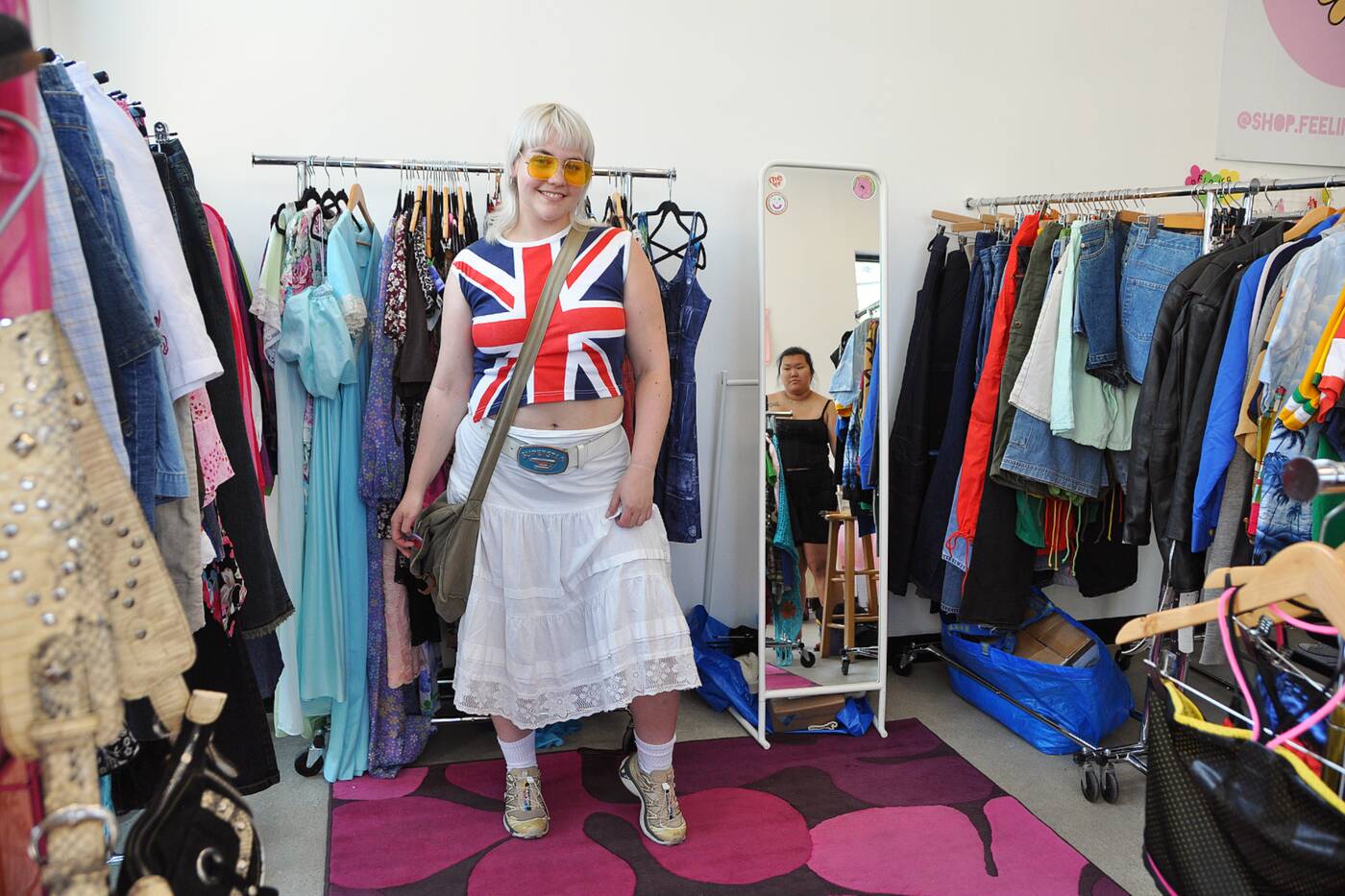How working together helped these queer artists find a place in Toronto's fashion community
Ang Kiriakos and Summer Shepherd are best friends and roommates. As a duo, they're an accomplished team of queer creatives breaking barriers in Toronto’s fashion scene.
Shepherd is a stylist and curator of popular vintage shop Cloth of the Curb, and Kiriakos is a model, a designer, and the creator of the Me+Art market. Both came out of an academic setting unsure that the fashion industry could financially support them, but they persevered and found ways to build on their passions.
Shepherd attended McMaster for Communications before moving to Toronto to start their vintage clothing business, whereas Kiriakos previously studied zoology in Guelph and now attends Toronto Metropolitan University for fashion.
The pair met in Toronto when a roommate connected them, and they immediately become best friends.
In collaborating, their combined skills have helped them build reputations in Toronto's fashion scene. It started when they teamed up to produce photoshoots for Cloth of the Curb.
The photos helped Kiriakos build a modelling portfolio, while boosting the growth of Shepherd’s brand on social media.
"People have started recognizing [COTC] as their favorite vintage brand," says Kiriakos proudly.
In fact, Cloth of the Curb was the only vintage clothing vendor at the Lavender Wild festival celebrating queerness at the start of Pride month, and Kiriakos was, of course, there to help.
Previously, Shepherd says they didn't receive many opportunities to vend in queer markets in Toronto because the vintage community is so over-saturated and the competition so stiff.
"Whenever I'm not accepted into markets, it always leaves me questioning myself and what I could be doing differently in order to be granted a space there," says Shepherd. So they were particularly grateful that the organizers of Lavender Wild recognized their business.
"Much of the clothing I curate is inspired by my queer identity and thus I find my best customer base to be my fellow girls, gays, and theys," says Shepherd. "That day at the festival broke records for COTC in terms of sales."
In supporting each other's passions, they’ve inspired meaningful creative direction in their respective careers.
Last June for Pride Month, they produced a Queer Prom photoshoot showcasing Cloth of the Curb vintage dresses.
"[For some models] it was an opportunity to redo the prom experience they were deprived of when they were younger," says Shepherd. "I found it to be the most rewarding creative project I’ve ever worked on in the city."
Kiriakos curated a similar experience with her recent solo textile exhibit at The Drake Hotel. They turned the hotel lobby into a dreamy environment for queers to be themselves and create a renewed adolescence, an experience that they weren't able to achieve in their youth.
After gaining traction styling creative projects for Cloth of the Curb, Shepherd began getting hired to style shoots and runway looks for other creatives in the city.
"I'm hoping as my business grows, I can create more opportunities to work with other queer creatives and start renting my collection for use in creative work," they said.

Summer Shepherd, curator of Cloth of the Curb, vending at the third Me+Art market on June 17.
Unsurprisingly, Shepherd was the first vendor that Kiriakos featured in the Me+Art market, which took place for the first time earlier this year.
The market is intended to create an affordable space for queer and BIPOC creatives to sell their work regardless of the medium, which is why performing artists are also welcome.
Having closely observed Shepherd's journey in the vintage market circuit and relating to the struggle of selling her own designs, Kiriakos says it’s very difficult for creatives to succeed in market environments.
"Because the vendor fee is often so high, and the artists pay for supplies on top of their attendance, there's no way you can profit," says Kiriakos.
In order to make Me+Art more affordable, she evenly splits the cost of rent between herself, each vendor, and each performing artist, rather than shouldering any individual with a heavy fee.
"If you have something that you think is not profitable, we'll find a way to make it profitable," they say.
In the future, Kiriakos hopes to secure grant funding to cover the rent so that they don't have to charge the vendors at all.
As for their collaborative work, Kiriakos and Shepherd like the idea of starting a collective to showcase their respective fashion works.
In the meantime, they continue to champion each other and fellow queer members of the fashion community.
Emma Johnston-Wheeler
Latest Videos
Latest Videos
Join the conversation Load comments







